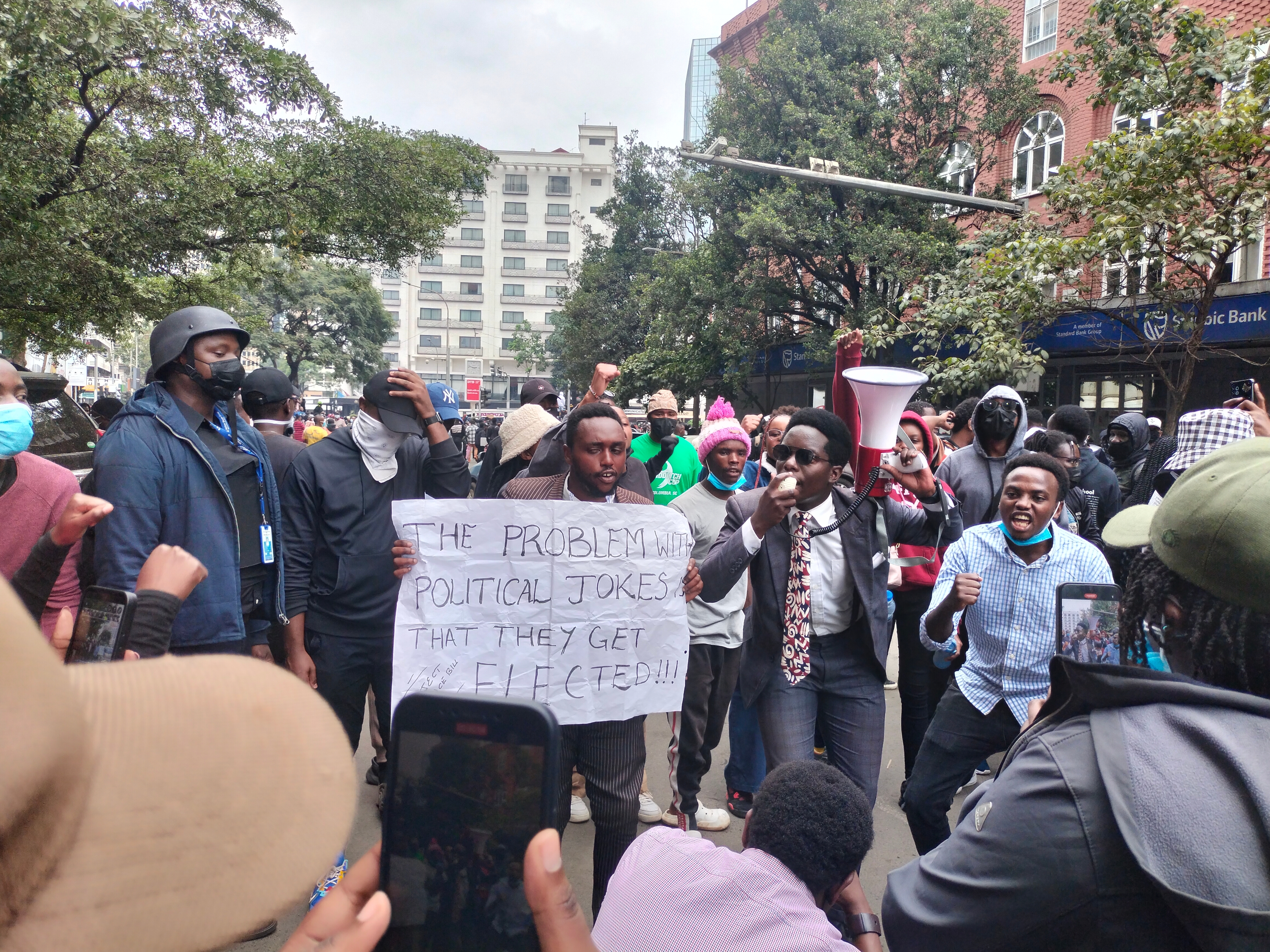Kenya
Bold Gen Z takes to streets, demands end to punitive finance bill

Protesters outside the Nation Centre on Kimathi Street in Nairobi, Kenya, on June 20, 2024. Kenyan youths countrywide are protesting against punitive tax measures in the Finance Bill
© ShutterstockGen Z uprising forces government to reconsider tax proposals
In what is being hailed as a new dawn for Kenya, the nation has experienced an unexpected uprising driven by a bold, new generation of young protesters. These determined activists on Tuesday took control of majority of Kenyan towns, exerting more pressure on Members of Parliament (MPs) to retract several unpopular tax proposals embedded in the 2024 Finance Bill.
Before this spectacle and for days on end, they had joined their elder generations in opposing the tax proposals contained in the bill, a brainchild of President William Ruto’s ambitious plan to have Kenyans fully fund their own budget.
For his determination to collect the taxes against the odds, the President earned himself the moniker Zacchaeus- Zakayo in Swahili - a Biblical tax collector. He had hoped to similarly ram it down, and nothing prepared his government for what happened this week.
Ahead of a crucial debate in parliament on Tuesday, Ruto summoned his wing of MPs to State House where he made drastic concessions, dropping some of the popular proposals, retaining some and re-jigging others.
Described as punitive and insensitive to the plight of already overburdened citizens, the bill included significant tax hikes. The government had defended these increases as essential to reducing reliance on external borrowing. The proposed tax hikes were expected to generate approximately $2.7 billion, equivalent to 1.9% of the country's GDP. Among the taxes that have been scrapped are those on cooking oil, mobile money services, and motor vehicles—proposals that critics argued would have adversely affected the insurance industry.
Despite the climb-down of the president (tax collector) christened by newspaper headlines on Tuesday morning in Biblical terms, young people poured on the streets. Their demand had now been scaled up to absolute rejection of the entire set of tax proposals.
Youth-led protests define new era of activism in Kenya
The defining feature of the protests is demographical characteristics of the people leading the protests; the Generation Z born between 1997 and 2012.
In their hundreds, they were a true definition of courage as they marched past armed police who from time to time lobbed teargas canisters at them or beat them up including using live bullets. They carried protests in Nairobi and other major towns across the country, bringing business to a halt. Not even the President’s hometown – Eldoret - was spared from the demonstrations.
Protesters live-streamed intense confrontations with officers using their smartphones. The protests were both physical and online, utilising hashtags like "#OccupyParliament," "#RejectFinanceBill2024," and "#UnfollowRuto" to pressure MPs to reject the bill and rally supporters. After the publication of the draft bill, TikTokers produced video explainers that were shared on social media platforms - WhatsApp, Facebook, Instagram, and X, attracting Kenyan influencers who spread the information further also in their local languages especially sheng’ a language spoken by majority of Kenyan youth. They also called on their MPs through the hashtag #SMSYourMP. One of the video clips urged opposition leader Raila Odinga, who for many decades has been the icon of anti-government protests, to take a break from the protests, asserting that it was now their turn.
The demonstrations were a new dawn in Kenya which for the first time in history witnessed a protest organised and executed by people who didn’t care about tribe, class or religion. They came united for a purpose. One infamous actor stated, “the baton has been passed on not to an individual or a political party or tribe but to a new generation of Kenyans.” Unlike previous protests marred by violence, looting, and stone-throwing, the Gen Z protesters exhibited maturity and peaceful conduct, maintaining a clear focus on conveying their message.
Despite being peaceful, over 200 of them were arrested though some of them were later released without charges.
And against their call, on Thursday, MPs voted to pass the Bill by 204 to 115 reflecting government-opposition divide. The protests continued late into the night, recording their first casualties with the shooting to death of two young protesters.
By the time Kenyans retired for the night, it was clear that the demos had snowballed into an open, colorful, generational revolt against failures of successive regimes.
On Friday afternoon, under the hashtag #TOTALSHUTDOWNKENYA, the Gen Zs launched a seven-day program featuring a series of activities dubbed ‘7 Days of Rage’. They are calling for a national strike on Tuesday, June 25, coinciding with the committee of the whole House meeting to once again oppose the proposed tax hikes.
Nzau Musau and Judie Kaberia are the Kenya project managers for the Friedrich Naumann Foundation for Freedom.

